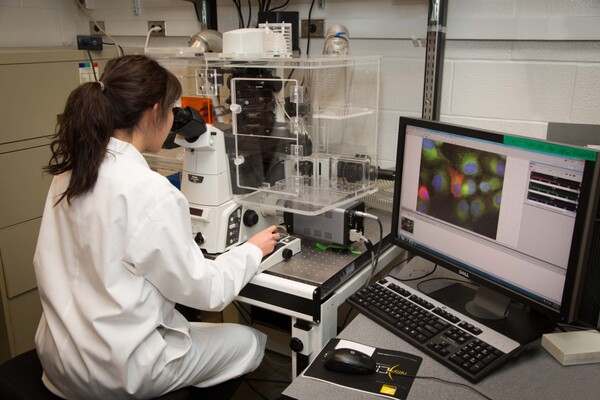
Main Second Level Navigation
Breadcrumbs
- Home
- Future Students
- Graduate Education
- Explore our Graduate Programs
- Thesis-Based Programs
- Nutritional Sciences
Nutritional Sciences
MSc & PhD
The Department of Nutritional Sciences positions itself as a leader in its field by leveraging the resources of the Temerty Faculty of Medicine and its strong affiliation with the Dalla Lana School of Public Health at the University of Toronto.
This provides our graduate students with unparalleled access to the highest concentration of university-affiliated hospitals, clinicians, and health researchers in North America. In fact, Toronto is home to the largest research and development (R&D) hub in Canada and the second largest food cluster in North America.
The department offers both MSc and PhD degree programs. Our graduate students work on the front lines of research with internationally recognized professors on competitive, peer-reviewed research projects. They present their research at international conferences and publish their work in high-impact journals and are frequently awarded prestigious scholarships.
Our Programs

In addition to completing a thesis, students take 2.0 FCE*:
- NFS 1204Y (Master Seminar Course in Nutritional Sciences, 1.0 FCE),
- Elective courses (1.0 FCE).
Students successfully finish this program in 2 years.
Alumni Profile

Zhila Semnani-Azad, PhD
During my time at the University of Toronto, I was lucky to be exposed to many areas of research and I had great mentors and collaborators who provided me with invaluable opportunities to learn, explore and develop critical and transferable skills.
Meeting experts and early-career scientists through seminars and conferences during my training motivated me to pursue a career as a research scientist where I can contribute to an ever-evolving field.
My advice to prospective students is to be open to new experiences and opportunities and to never let pre-existing notions of what you would or would not be interested in, or self-doubt, limit you from exploring. Also, never underestimate the importance of networking and mentorship. The best way to learn and to broaden your horizons is to talk to as many people as you can!
Potential Career Paths
In 2022, the School of Graduate Studies (SGS) tracked the career outcomes of 5,128 PhD students who graduated from the University of Toronto between 2016 to 2021. The data below is from 45 nutritional sciences PhD graduates.
Positions
Some examples of the positions our molecular genetics graduates held included:
- Postdoctoral fellowships
- Biotechnology and pharmaceutical jobs
- Hospital-based jobs
Employers
Some examples of employers for whom our molecular genetics graduates worked included:
- The University of Toronto
The chart below shows a percentage breakdown of the various sectors in which our nutritional science PhD graduates worked at the time the survey occurred.
Main Employment Sectors of Nutritional Sciences PhD Graduates
Chart data
| Post-Secondary Education | Private Sector | Public Sector | Charitable Sector | Individual Sector | Info Not Public/Other |
|---|---|---|---|---|---|
| 60 | 20 | 6.7 | 2.2 | 4.4 | 6.7 |
By the Numbers
Department of Nutritional Sciences
*Full course equivalent. A typical 0.5 FCE is over one term (13 weeks), meeting 1-2 times per week. A typical 1.0 FCE is over two terms (26 weeks), meeting 1-2 times per week.
